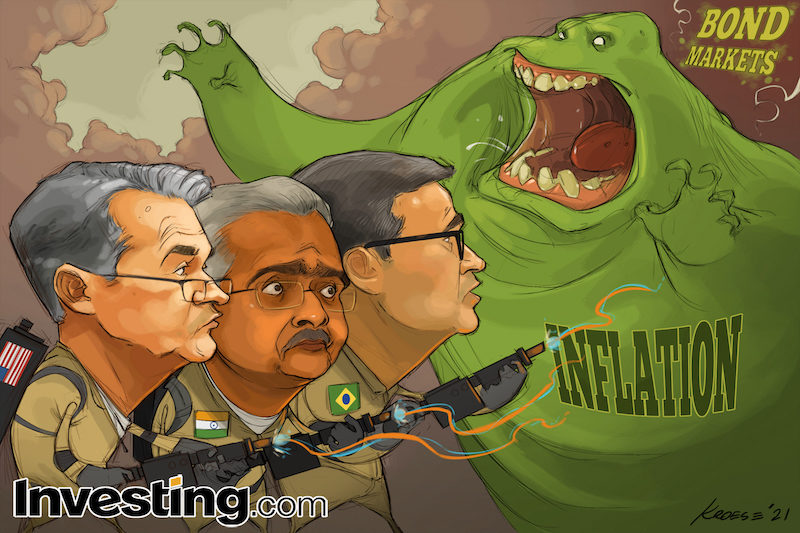By Geoffrey Smith
Investing.com -- Global financial markets got a fright last week, as the specter of inflation rattled its chains loudly at investors and central bankers around the world.
It’s easy to see why: global commodity prices were surging, with copper hitting its highest in 10 years and crude oil roaring back to its highest since pandemic went global a year ago. A violent distortion of consumer spending patterns has pushed prices for certain goods up, exacerbated by disruptions to global supply chains.
In the U.S., the new administration of Joe Biden, with the perennially dovish Janet Yellen as Treasury Secretary, is rushing through a $1.9 trillion stimulus package, while the Federal Reserve is printing money at a rate never ever seen during the 2008-9 Great Financial Crisis, $120 billion a month. In the Eurozone, the European Central Bank is still talking of a potential need to speed up a quantitative easing program that, while radical by regional standards, is barely half the Fed’s.
Coupled with that, there have been the first stirrings of inflation consumer price indices, with the Eurozone’s inflation rate heading back above zero, and Brazil’s rising for an eighth straight month to 4.6%, its highest level in nearly two years. India’s inflation rate peaked at over 7% in November before a much-needed easing in food prices brought it back down to just over 4% in January.
The inflation specter would have you believe that the historically loose policies of central banks around the world are simply paving the way for wholesale currency debasement. That someone is prepared to pay over $50,000 for a piece of computer code suggests that trust in the ability of the dollar to keep its purchasing power is not exactly unshakeable.
However, the reality of inflation – as with ghosts in general – is that it doesn’t exist. At least not in any form that threatens to destabilize the world economy.
Federal Reserve Chairman Jerome Powell spelled it out bluntly in two days of testimony before Congress last week: with 10 million fewer jobs in the economy than a year ago, the amount of slack is still enormous. As analysts at TS Lombard point out, this year is going to be about a recovery in services, which generally pays less than manufacturing. As such, the creation of new jobs will depress average hourly earnings growth, which is a key forerunner of inflation. TS Lombard’s bean-counters see core inflation at 1% late this year, and only picking up to 1¾% by the end of 2022.
Inflation in the Eurozone is even more of an illusion: the currency union had already undershot the ECB’s inflation target for a decade even before the onset of the pandemic. The CPI is now back at 0.9% almost entirely due to the end of a pandemic-driven cut in Germany’s VAT rate, tweaks to its national regime for carbon pricing and the absence across the region of January sales (another result of pandemic driven distortions of consumer spending patterns). Analysts at ABN AMRO estimate that core inflation actually fell in February to 1.2% from 1.4%.
As much as they love a good ghost story, in their hearts, bond investors know this. Eurozone bond yields turned smartly downwards after ECB board member Isabel Schnabel said last week that the ECB would respond to any unwarranted sell-off in bonds with even bigger interventions to keep yields down. The Reserve Bank in Australia similarly smacked bond bears who dared to question its commitment to keeping yields down, sharply ramping up purchases of three-year and 10-year bonds over the last week.
In Brazil and India, where memories of inflation are fresher and food prices in particular have a bigger role in the national economic debate, it does seem that central banks are going to have to work harder to stop an unwanted rise in bond yields. The 10-year benchmarks of both countries have hit 12-month highs and continue to rise.
But even here, analysts see worries as largely overblown. JPMorgan analysts led by Bruce Kasman point out that recent volatility as “exacerbated by concerns over a repeat of the (Emerging Market) financial instability during the 2013 taper tantrum.”
“We do not think EM economies are vulnerable in the same way they were in 2013, in part because there is little sign of overheating and external imbalances are virtually absent this time around,” Kasman wrote to clients last week.
In Shakespeare, the murdered Banquo appears at MacBeth’s feast as the visual expression of MacBeth’s guilty conscience. In the same way, the ghost that many investors saw last week can be seen as the expression of an uneasy awareness that last year’s profits were made possible only by extraordinary policy support, rather than their own investing acumen.
Sooner or later, reflationary policies will find traction, albeit without causing anything like the runaway inflation of the 1970s. At that point, questions about interest rates will have more validity.
As TS Lombard’s analysts put it: “It looks odd to be simultaneously expecting an upsurge of inflation and pricing stocks on the assumption that interest rates will be negligible for ever.”
